uBlock Origin - Free, open-source ad content blocker.
Easy on cpu and memory..
Github (gorhill/uBlock)
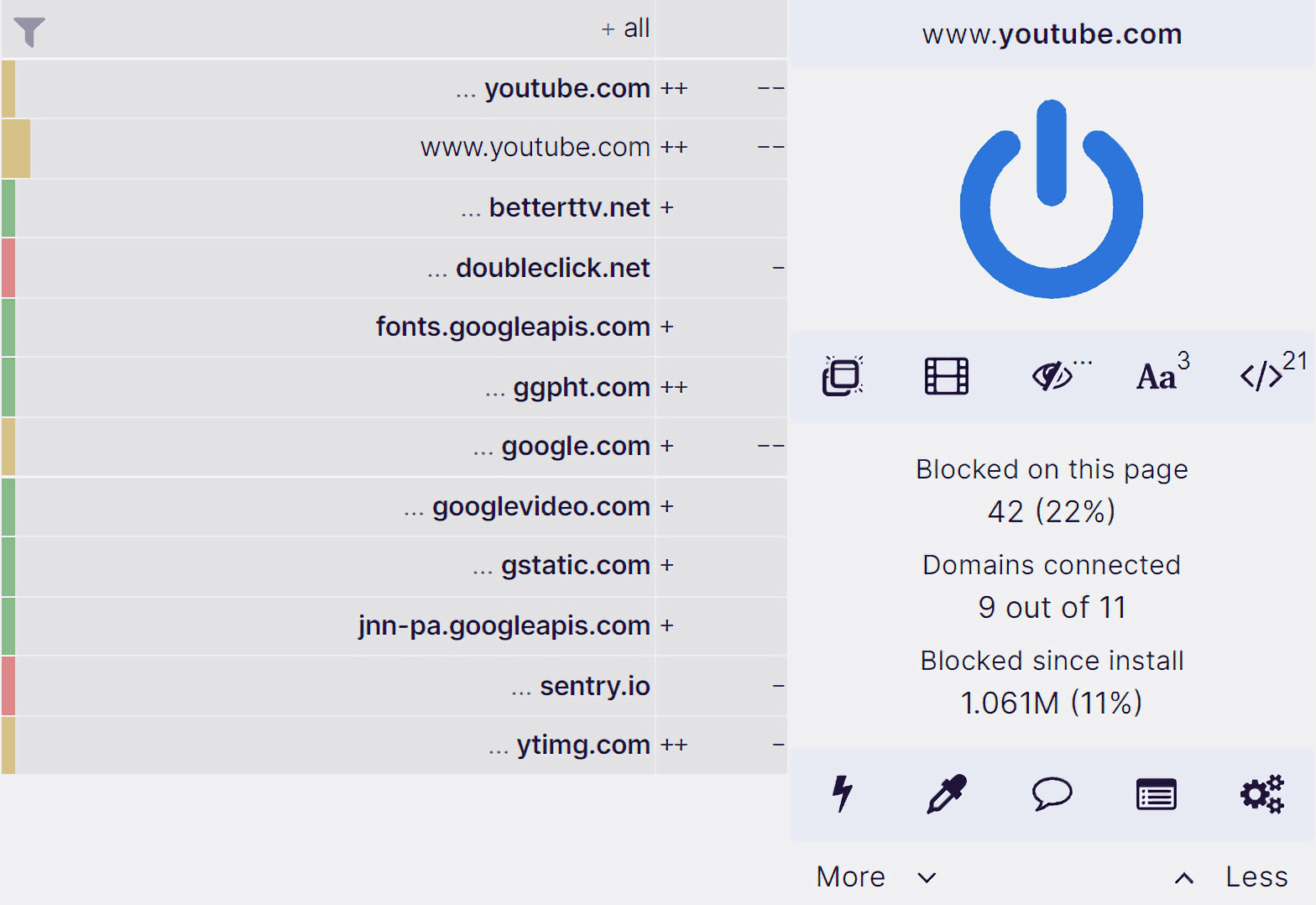
uBlock Origin is not just an “ad blocker“, it's a wide-spectrum content blocker with CPU and memory efficiency as a primary feature.

Open-source ad blocker
The uBlock Origin is a free and open-source, cross-platform browser extension for content filtering—primarily aimed at neutralizing privacy invasion in an efficient, user-friendly method.
CPU and memory efficiency
Globally, uBlock Origin could save consumers more than $1.8 billion/year( study ). Open source ad blockers are a potentially effective technology for energy conservation.
Various browsers support
uBlock Origin’s extension is available for several of the most widely used browsers, including: Chrome, Chromium, MS Edge, Opera, Firefox and all Safari releases prior to 13.
About uBlock Origin
In 2014 uBlock Origin’s founder, original author and lead developer, Raymond Hill, created the original uBlock extension, with its development initiated by forking the codebase of HTTP Switchboard with a separate blocking extension, uMatrix, which had been previously designed for advanced users. The initial uBlock was developed by Raymond Hill in order to enable community-maintained block lists while simultaneously adding additional features and upgrading the code quality to proper release standards. First released in June 2014 as an exclusive Chrome and Opera extension, in late 2015 the initial uBlock extension expanded to other browsers under its current name – uBlock Origin. (occasionally represented globally as – uBlock₀).
Following this 2015 introduction, a collaborative comsource and Sourcepoint industry research survey reported an 833% growth rate over a 10-month period ending in August 2016, the most rapid growth among any industry software publicly listed at that time. This report attributed this enormous surge to collective user demand for “pure” blockers with the capacity to operate outside the “acceptable advertising” program used by AdBlock, and other industry extensions.
Quickly gaining traction throughout the entire ad-blocking industry, the uBlock Origin Firefox version collected over 5 million active users, with its Chrome extension subsequently compiling over 10 million active users. Developer Nik Rolls then officially released uBlock Origin for the Microsoft Edge browser in December 2016.
In January 2017, uBlock Origin was added to the repositories for Debian 9 , and Ubuntu (16.04), and the uBlock Origin extension was awarded the prestigious IoT honor of “Pick of the Month” by Mozilla.
As of 2024, uBlock Origin continues to be maintained and actively developed by founder and lead developer Raymond Hill.
The uBlock Origin extension remains an industry leading, open-source, cross-platform browser extension with software developed specifically for multiple platform use, and as of 2024, uBlock Origin’s extension is available for several of the most widely used browsers, including: Chrome, Chromium, Edge, Opera, Firefox and all Safari releases prior to 13.
The uBlock Origin project still specifically refuses donations at this time, and instead advises all of its clients, users and supporters to donate to block list maintainers.
Sign up for our daily newsletter
- Privacy Policy
- Advertise with Us
The Ultimate Superuser’s Guide to uBlock Origin
uBlock Origin is the most powerful and versatile ad blocker available. Unfortunately, the design is also a little obscure. This guide will explain the ins and outs of uBlock Origin’s advanced features, including adding custom lists, creating custom user filters, setting up dynamic blocking rules, and adjusting rules for uBlock Origin on specific domains with the advanced user interface.
Installing uBlock Origin
Setting up advanced options, dynamic filtering rules, saving and reverting filtering rules, third-party scripts and frames, viewing and editing dynamic rules, removing elements with static rules, finding and using custom filter lists, storing and syncing rules.
A pre-built version of the uBlock Origin extension is available for Google Chrome , Firefox , Safari , Microsoft Edge and Opera . You can also build the extension manually from source for Firefox and Chrome.
Also read: uBlock Origin – Better Than AdBlock Plus?
A quick warning : uBlock Origin is not and has never been connected to ublock.org or the uBlock extension. The Origin part in the name is very important in distinguishing between these two unrelated projects that once shared a similar codebase. ublock.org and the uBlock extension should be avoided, as they are imitators that purposefully confuse the market to steal data and deceive users. Be sure you have uBlock Origin and not uBlock.
Before we can do anything interesting with uBlock Origin, we need to enable advanced settings. Make sure to check out the required reading before you proceed. If you lack the troubleshooting experience to manage these types of decisions, consider reading up on how cookies work before you start tinkering with their functionality. Otherwise, expect the unexpected!
1. Click on the uBlock Origin extension’s icon.
2. Click the Settings icon.
3. Tick the box next to “I am an advanced user.”

Once you have advanced settings enabled, you can adjust blocking settings on a granular level.
Filtering is handled in uBlock Origin at two levels: globally and locally. Global rules apply to all URLs, while local rules are for the current URL only.
The first column specifies the URL that the content originates from.

The second column indicates global settings, which are inherited by the specific URLs.

The third column indicates local rules for the current URL.

If you mouse over a box in the “global” or “local” rules column, you’ll see red, grey, and green thirds.

Click on the red third to set a blocking rule for the associated content type. The green third permits the corresponding element. The grey third sets a “noop” rule, which stands for “no operation.” This setting will prevent uBlock Origin from taking action on the associated content. Setting a “noop” filter will override global settings for a specific URL.
At the top of the window are content types. These can be blocked at the global and URL-specific level. These are blunt filters but useful nonetheless.
Under the content types are the URLs loaded on the current webpage. A plus icon indicates that content from that URL is being permitted. A minus icon indicates that content from the URL is being blocked. You can sometimes see a mixture of pluses and minuses for one URL, which indicates that some of the content is permitted while other content is blocked.
You can also look at the color coding next to the URL. Green indicates that content from that URL is permitted. Yellow indicates that some content from that URL is blocked. Red indicates that all content from the URL will be blocked.
Settings an inherited based on specificity. For example, global content type rules have the lowest priority. Rules set on filtering lists have a medium priority ranking: they can override global settings, but not URL-specific user settings. The highest priority is given to URL-specific local rules set by the user.
Changes you make to filtering rules are automatically reset the next time you visit a website. To make your settings permanent, click the lock icon.

To revert to the last saved state, click the eraser icon.

In general, it’s a good idea to block third-party scripts and frames by default. This protects both your privacy and your eyeballs. It can also break websites, so keep a quick finger on the “noop” override.
To block third-party scripts and frames, click the red third of the box next to each in the global column. This will automatically block all third-party scripts and frames on every URL.

If a website breaks, you can set a “noop” override to permit third-party scripts and frames. Click the grey box in the local rules column to set a “noop” rule and override the global blocking rule for this URL.

This noop rule will only apply to the current URL.
Alternatively, you can also hunt down the URL of the blocked resource and permit that resource specifically. This is easiest with the third-party frame has a clear origin, like a YouTube or Twitter embed. If you permit those frames globally and save the rule, those URL-specific filters will trump the global content type filters.
By balancing global and local filters with content type filters, you can set sensible online privacy settings while permitting content you don’t find as objectionable.
To view the filters that you’ve already set, look at uBlock Origin’s Settings page under the My Rules tab. Here, you’ll see the rules you’ve set in two lists. The list on the left is for permanent rules and the list on the right is for temporary rules, as indicated by their headings.

The text contents of the right-most temporary rule column can be edited directly with the cursor, mouse, and keyboard. If uBlock Origin detects a difference between the two columns, you’ll see contextual buttons labeled “Revert” and “Commit” that offer the option to sync the columns with one another. Click “Revert” to copy the unchanged contents of the permanent rule list to the temporary rules list. Click “Commit” to copy the change from the temporary rules list to the permanent rules list.
You’ll notice that the text formatting of the rules follows specific conventions. The syntax is like so:
If you follow the dynamic filtering rules syntax guide on uBlock Origin’s GitHub page, you can change and set rules with text strings directly from this pane.
Also read: How to Get More Out of Your Adblocker
If you want to remove elements from the page using graphical tools, you can access that feature by setting cosmetic rules. These rules remove DOM elements based on a graphically-based node selection by the user. If you see something on a website that bothers you, like a email subscription banner, an ad-block detector, or anything else offensive to your sensibilities, you can remove it this way.
Temporary Rules: Element Zapper
There are two different ways to set cosmetic rules in uBlock Origin. The first is with the Element Zapper, accessed through the lightning bolt icon on uBlock Origin’s extension dropdown pane.

This tool sets a temporary rule removing the specified DOM element. With the next browser session, the element will return. To create a rule, click the element zapper icon, and then click on the page element you want to remove. As you mouse over various DOM elements, they’ll be colored yellow to indicate what element is currently selected. Once the right element is selected, click to remove the selected element instantly. No confirmation box will appear after clicking

The element zapper will do its best to pick the element you’ve selected, but you might need to dance your mouse around a bit to get the element you’re hoping for. It will attempt to adhere to the largest DOM object that its algorithm can locate and select.
Permanent Rules: Element Picker
To set a permanent rule, use the Element Picker, represented by the eyedropper icon to the right of the lightning bolt.

This will activate an interface similar to the element zapper, but now DOM elements will be highlighted in red instead of yellow.

When you click on the red highlighted element, a text box will appear in the lower-right, previewing the class or ID of the selected element. It’s this text-based class or ID match that will be used to remove the element in the future. And since many sites obfuscate their code to make ad blocking more difficult, you may need to refine the element picker’s automatic selection from time to time. You can also use this tool to select “layers” of the DOM that are completely obscured or exist only in DOM logic.

To select a different element, mouse over its name in the yellow box below the white text box. Click on the text to see the associated element highlighted in red.

When the correct element is selected, click the “Create” button to create the rule and remove the element. You can also click the adjacent “Pick” button to return to the element picker if you selected the wrong part of the page.

In the future you can find the rule in uBlock Origin’s settings under the “My Filters” tab. New rules will appear at the bottom of the list with their data and timestamp.

If you want to ignore a rule, you can type an exclamation point at the beginning of the line to comment out the element rule. You can also see additional static filer syntax in uBlock Origin’s documentation on GitHub.
uBlock Origin comes with some preset filter lists, but there are many more you can add. The easiest way to add more filters is to browse FilterLists .
If you find a filter list you want to add to uBlock Origin’s filters, click “Details” and then “Subscribe.” This will automatically download and include the list in uBlock Origin’s blocking rules for websites visited in the future. Only lists with the uBlock Origin icon can be added to uBlock Origin in this way.

These filters will then appear under the “Filter Lists” tab in uBlock Origin’s options page. They can be viewed and toggled from that page in the future.

To make a local backup of your uBlock Origin rules, you can save your settings out to a file. Find the dialog options at the bottom of the main uBlock Origin settings tab.

If you want to use the browser-based cloud storage for extensions, you can tick the “Enable cloud storage” option on the main page of uBlock Origin’s settings. This will allow you to upload data within the extension’s small file space within the browser. This only syncs with other copies of the same browser, however.

If you upload your uBlock Origin settings in Firefox, you cannot then download them in Chrome on another computer. As a result, sharing configurations through files is the most reliable method of the time being. To sync your rules among multiple browsers and computers, you can share the backup configuration text file over a cloud storage service.
uBlock Origin isn’t exactly an ad blocker. It’s a wide-spectrum content blocker. That means it can control what comes into your browser no matter its origin. That makes it extremely powerful, and extremely easy to mess up. So take care with what you do, and if something breaks, be prepared to fix it.
Our latest tutorials delivered straight to your inbox
Alexander Fox is a tech and science writer based in Philadelphia, PA with one cat, three Macs and more USB cables than he could ever use.

A no-nonsense ad blocker
Your web experience has never been this fast and efficient.
- no sneaky tracking
- no overhead
- memory efficient
- lightweight
Add uBlock to your browser
Set and forget.
Add uBlock to your browser to automatically block ads, pop ups, and trackers. Browse faster.
The best ad blockers in 2024
Say goodbye to intrusive online advertising with the best ad blockers

Best in-browser ad blockers
Best ad-blocking apps, best ad-blocking mobile apps, other privacy-focused extensions and apps.
The best ad blockers unfortunately very necessary yo survive on the modern internet. It doesn't matter where you go, there's the risk of being harassed by pop-ups, tracker cookies, malvertising and countless other digital nasties that seem hell-bent on ruining your online experience. Even if all your browsing is above board.
Thankfully there's no shortage of apps and browser extensions that can block ads and keep you safer when you're online. Combined with the best antivirus software and the best VPNs , a good ad-blocker gives you a perfect arsenal of tools to offer as much protection as possible. Even the FBI recommends using an ad-blocker for protection.
The only thing you need to figure out is which ad-blocker is right for what you need. There are so many to choose from, and whether you are willing to live with the downsides. Most free sites rely on advertising revenue to survive, including Tom's Guide. But if you're happy with the trade-off, we've got a thorough list of the best ad blockers and privacy tools — with options for every browser and platform.
The best ad blockers you can get today
1. adblock plus (chrome, edge, firefox, opera, safari, android, ios).
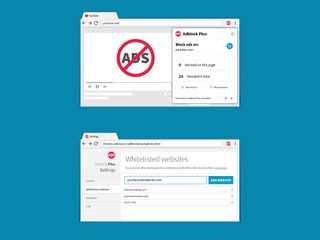
AdBlock Plus (ABP) is among the most popular ad blockers, with extensions available for Firefox, Chrome, Safari, Edge and Opera. ABP features a quick setup, loading preset filter lists that allow users to quickly block most ads, as well as the option to filter malware and social media buttons.
Savvy users can chose additional block lists as well as set custom filters or whitelist their favorite sites to keep their ad revenue in the black. AdBlock Plus allows what it calls "non-intrusive advertising" through filters; that may irk some users, though this feature can be disabled in settings.
On Android, the AdBlock Browser provides a Firefox-based browser that blocks incoming advertising, while on iOS, the AdBlock Plus app integrates with the content blocker system to seamlessly block advertising on Safari with minimal setup.
Download AdBlock Plus: Firefox , Chrome , Safari , Opera , Edge
2. AdBlock (Chrome, Firefox, Safari, Edge)
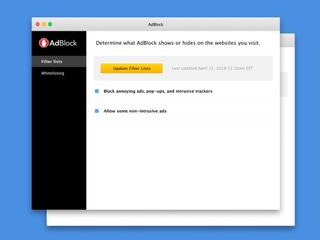
AdBlock (no relation to AdBlock Plus) is the other best ad-blocking browser extension of note, available for users of Chrome, Firefox, Edge and Safari. AdBlock uses a series of filter lists to automatically block ad content coming from known ad servers and providers. Users can stick with the default block lists, subscribe to additional ones, or even create their own, as well as whitelist their favorite websites.
As one of the most downloaded Chrome and Safari extensions, AdBlock has the trust of many users worldwide.
Download AdBlock: Chrome , Firefox , Safari , Edge
3. uBlock Origin (Chrome, Firefox)
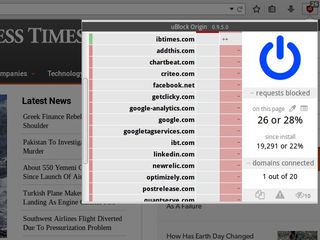
Ublock Origin is a browser-based ad blocker that focuses on simple, efficient blocking with a low resource overhead. The extension comes loaded with a number of filter lists for known advertising and malware sources, with extra filter lists available and the option to read and create your own custom filters from hosts files.
Download Ublock Origin: Chrome , Firefox
4. Poper Blocker (Chrome)
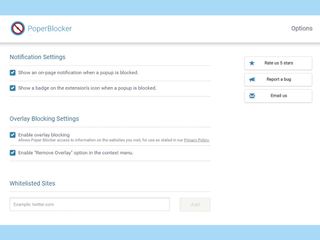
Rather than be an all-in one blocking solution, Poper Blocker (aka Pop Up Blocker For Chrome), is designed to complement other adblockers.
In this case, Poper Blocker focuses on blocking pop-ups, pop-unders, overlays, timed and scroll pop-ups, and other varieties that might slip past other ad-blocking extensions. Small notifications tell you when pop-ups are blocked. You also can view your blocking stats, but otherwise, you can generally just keep Poper Blocker running in the background with minimal impact alongside other adblocker extensions.
Download Poper Blocker: Chrome
5. Stands Fair AdBlocker (Chrome)
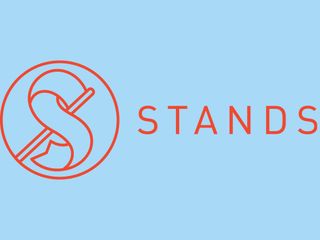
For a fast and light ad-blocking plugin, Chrome users can turn to Stands Fair AdBlocker. The extension does precisely what it promises, blocking ads and pop-ups from cluttering up your browser view while also preventing any tracking from going on.
Stand's Fair AdBlocker gives you control over the type of ads you can block, specifying everything from autoplay video ads, YouTube ads, expanding ads and more. It can even block Facebook ads if you want.
The "Fair" part of AdBlocker comes into play by giving you the ability to allow certain types of ads or even whitelist ad-supported websites you don't want to shortchange of badly needed revenue. This is one ad blocker that doesn't take a scorched earth approach to its stated purpose.
Download Stands Fair AdBlocker: Chrome
6. Ghostery (Chrome, Firefox, Opera, Safari, Edge)

Like the other extensions on our list of the best ad blockers, Ghostery can remove ads from webpages, so you can focus on content and browse more efficiently. But the real value in Ghostery lies in its privacy protection features. You can use Ghostery to view trackers, which lets you see who's trying to collect data on you. With Ghostery, you can also stop that tracking from taking place. If you really want to safeguard your privacy, you can turn to Ghostery's Enhanced Anti Tracking to anonymize your data.
Ghostery's a free download that offers basic web protection. More advanced protection starts at $4.99 a month and the $11.99 monthly tier comes with a built-in VPN. There are also versions of Ghostery that work with Android and iOS devices.
Download Ghostery: Chrome , Firefox , Opera , Safari , Edge
7. Adblocker for YouTube (Chrome, Firefox)
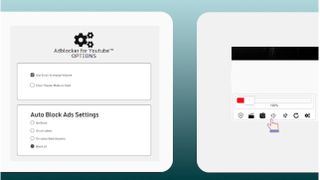
YouTube has gotten more aggressive with ads, so the makers of ad-blocking extensions have followed suit. Adblocker for YouTube is a Chrome extension that promises to automatically block YouTube ads, whether we're talking about the pre-roll ad appearing before your video or any text and banner ads that appear on the video itself.
If you prefer Firefox to Chrome, there's also an AdBlocker for YouTube extension that works on that browser. Same name, different developer apparently, but the functionality of stripping out video and display ads remains. This version works on Android devices too.
Download Adblocker for YouTube: Chrome , Firefox
1. AdGuard (Windows, Mac, Android, iOS)
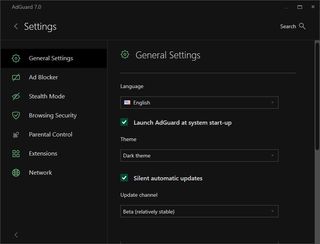
Uses looking for a more robust experience can try out the subscription-based AdGuard, which provides desktop and mobile options to reduce the ads you see when surfing online.
AdGuard on Windows and Mac covers popular browsers, with highly configurable options for ads, content, and tracker blocking, as well as a parental controls module for restricting adult content. AdGuard for Android is a no-root ad-blocker that blocks advertising on apps and games, though you’ll have to install it from AdGuard’s site instead of through Google Play. AdGuard for iOS works with Safari to effectively filter ads on the default browser.
Download AdGuard: Windows , Mac , Android , iOS
2. AdLock ($33 per year)

AdLock avoids the browser-based route, instead opting to run as a separate program to be able to block not only browser-based ads, but also advertising in other programs like Skype or games.
The app runs in the background, using filters to block ads, popups, and autoplaying videos, speeding up loading times and applying Safe Browsing features to automatically block sites that are known to be unsafe.
For obvious reasons, the mobile version is unavailable on the Google Play Store, so you'll need to sideload the app if you want to get AdLock into your Android device. iOS users can download AdLock directly from Apple's App Store.
Download AdLock: Windows , Chrome , Android , Mac , iOS
3. Wipr (macOS, iOS; $1.99)
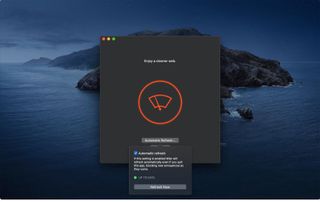
If you’re a Safari fan, Wipr may be the best ad blocker for both your Mac and iPhone. The app is available for both iOS and macOS — costing $1.99 from either Apple App Store — and it promises to work with Safari as well as apps that use Safari for displaying web pages.
You’ll find a full array of features with Wipr, which not only blocks apps and trackers, but cryptocurrency miners, EU cookie and GDPR notices and anything else that gets in your way of surfing the web. Its blocklist gets updated twice a week, and there’s little configuration; the idea is that you load Wipr and forget that it’s there while it does its job in the background.
With Wipr, pages should load faster in Safari, which will be particularly welcome if you’re surfing from an iPhone, where ads and trackers can bog down your browser’s speed.
Download Wipr: macOS , iOS
1. 1Blocker (iOS)

1Blocker was one of the first really good ad blockers on iOS when Apple opened up that functionality on iPhones and iPads; the apps has since been optimized for Safari.
The app is designed to make browsing faster and more secure by blocking ads, popups, trackers and other online cruft. Rather than blocking content of a downloaded page, 1Blocker works with Safari's content blocker API to tell the browser what to block in advance, saving time and resources.
1Blocker features more than 115,000 blocker rules, custom regional adblocking settings, and easy-to-use custom rules settings. The app is a free download, with premium features available as in-app purchases.
Download 1Blocker: iOS
2. Firefox Focus (Android, iOS)

Firefox Focus is another addition to Mozilla's family of browsers. This one's a privacy-oriented version of Firefox that bakes in ad-blocking and anti-tracking into a light and functional package. Firefox Focus blocks ads and speeds up browsing, while also working in privacy-friendly features like automatic history and cookie clearing.
Users can selectively block ads, analytics, content and social trackers with easy toggles, turn on a "stealth" mode, and set a default search engine.
Our look at the best Android browsers has more on the various flavors of Firefox.
Download Firefox Focus: Android , iOS
3. AdClear (Android, iOS)
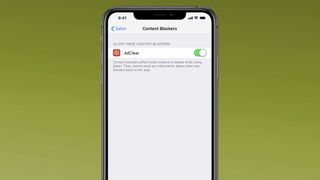
AdClear — or AdClear Plus if you're searching for the iOS version — offers the kind of mobile ad blocking in browsers that similar apps provide. But AdClear takes it one step farther by also blocking ads in apps.
AdClear achieves this through a DNS changer feature that routes traffic through a VPN. AdClear doesn't catch everything in all apps, and in our experience, some apps ran a little slower. But this free download can put a stop to ads interrupting what you're trying to do whether in an app or a browser.
Download AdClear: Android , iOS
1. Decentraleyes (Chrome, Firefox)

Some times, blocking ads can also prevent websites fromn pulling needed resoruces and libraries from third-party sources, breaking web pages in the process. Decentraleyes tries to stop that from happening by acting as a local content delivery network emulator to serve up the files that websites need. By doing so, this extension can stop websites from sending out requests to the likes of Google Hosted Libraries.
Think of Decentraleyes as a complement to ad blockers. In fact, the extension specifically says it can work with uBlock Origin and AdBlock Plus, both of which we recommend up above.
Download Decentraleyes: Chrome , Firefox
2. Opera (Desktop, Android, iOS)

The Opera browser bakes in ad-blocking features into the browser without the need for an extra add-on, while also offering privacy-friendly tools such as an unlimited, built-in VPN service, incognito mode, fraud and malware warnings for suspicious links and pages, and more. In addition, you can further customize Opera's capabilities with a wide array of extensions.
Mobile users need not fret, as the Android version comes with just about everything the desktop version has but built for touch-screen interfaces. On iOS, the mobile version of Opera is listed in Apple's App Store as Opera Touch. (Incidentally, we've got a guide on how you can use Opera to block ads on the iPhone .)
Download Opera: Mac or Windows , Android , iOS
3. Privacy Badger (Chrome, Firefox, Opera)
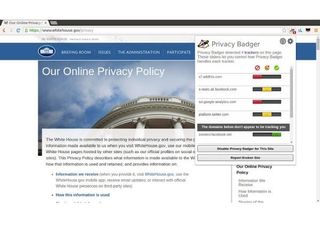
The Electronic Frontier Foundation's Privacy Badger browser extension was born from the EFF's concerns about the business models of some privacy tools and ad blockers.
Privacy Badger functions similarly to extensions like AdBlock Plus (on which it was based), observing the various tracking tools that advertisers and other third parties might use to track your online activities and selectively blocking them from executing. Built-in learning algorithms adapt to the sites you visit and take any new tracking tools discovered into account.
While not explicitly an ad blocker, Privacy Badger does also block some advertising, depending on how aggressively the ads track you across websites.
Download Privacy Badger: Chrome , Firefox , Opera
4. Tor Browser (Desktop, Android)
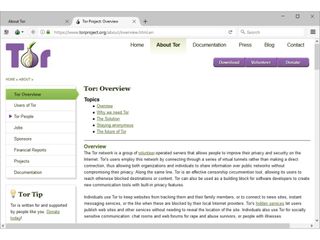
The Tor network helps anonymize your internet activity by bouncing the data you send and receive through a distributed anonymous network of routers to foil a common online surveillance technique called traffic analysis, which can reveal the sites you visit or who you're communicating with.
The Tor Browser is an all-in-one package that includes everything you need to surf the net through the Tor network in an easy-to-install portable package. The package includes a modified version of Firefox with privacy aids such as NoScript baked in, and an automatic setup aid that makes it easy to connect to and create new Tor circuits.
On the desktop, you can grab a version of Tor Browser for Windows, macOS or Linux. There's also a version of Tor Browser for Android, which replaces the previous OrBot + OrFox combination recommended for browsing Tor on Android.
Download Tor Browser: Desktop , Android
5. Onion Browser (iOS)
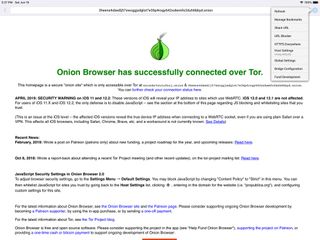
iOS users aren’t left out when it comes to browsing the Tor anonymizer network, with the Onion Browser among the more popular options on Apple’s mobile OS.
Previously a premium app, Onion Browser has since moved to a donation model, opening up access to everyone who wants to download the app, without compromising security or features. The usual caveats apply: Browsing through Tor will slow down the web experience, and some features, like video streams and video files won’t work in order to preserve anonymity.
Download Onion Browser: iOS
How to choose the best ad blocker for you
Many of the best ad blockers are available for free, either as extensions or as standalone apps, though a few, like AdLock, charge a fee. Determine if the free services provide enough ad-blocking to meet your needs or whether a paid app delivers more for your money. You should also figure out if a browser extension will take care of your ad-blocking needs or whether you should consider switching browsers to one with more built-in privacy features.
You can narrow down your choice in ad blockers by deciding specifically what you're looking to accomplish with such an app or extension. Do you just want to stop annoying pop-up ads from appearing or do you want the full range of services, including privacy features and an end to ad-tracking? Grab the ad blocker that ticks off all the boxes on your wishlist.
Some ad blockers, such as AdBlock Plus include filters and the ability to let in non-obtrusive advertising. Others, like AdBlocker Ultimate, take a more aggressive approach. Find out which one best suits your needs and comfort level.
As we noted at the outset, there's also an ethical component to ad blockers. Do you feel comfortable keeping ad revenue out of the hands of sites you enjoy and use for free? As good as the best ad blockers are, that's still a trade-off you need to consider when deciding whether to install one as a browser extension or as a standalone app.
Sign up to get the BEST of Tom’s Guide direct to your inbox.
Upgrade your life with a daily dose of the biggest tech news, lifestyle hacks and our curated analysis. Be the first to know about cutting-edge gadgets and the hottest deals.
Hackers could ruin your 4th of July cookout if you own one of these smart grills — update right now
Downloading this popular new browser could leave your Mac with a nasty malware infection — don’t fall for this
Moshi Chat's GPT-4o advanced voice competitor tried to argue with me — OpenAI doesn't need to worry just yet
- kep55 I'm waiting for an ad blocker that will spoof the websites into thinking there is no ad blocker in place. More and more sites are incorporating code that disables the site entirely or many of the features if an adblocker is in use. Reply
kep55 said: I'm waiting for an ad blocker that will spoof the websites into thinking there is no ad blocker in place. More and more sites are incorporating code that disables the site entirely or many of the features if an adblocker is in use.
- View All 2 Comments
Most Popular
- 2 PlayStation just beat Prime Day with must-play PS5 games from $5 — here's 13 deals I’d buy
- 3 Mattress Firm's 4th of July sale is giving away an adjustable base with every queen Sealy Posturepedic hybrid — now $850
- 4 ChatGPT for macOS just got caught breaching Apple security rules — how that affects you
- 5 5 best gardening tool deals under $50 you can get before Prime Day
Advertisement
- Software and apps
Our Favorite Ad Blockers and Browser Extensions to Protect Privacy

By Thorin Klosowski
Everything you do online—from browsing to shopping to using social networks—is tracked, typically as behavioral or advertising data. But browser extensions are simple, generally free add-ons that you can use to slow down or break this type of data collection, without completely ruining your experience of using the internet.
Browser extensions, also called add-ons, are tiny bits of software you can download to add new features to your web browser. They are sometimes created by developers as a hobby project to solve a problem for themselves, but are also developed by larger companies as part of their own suite of software.
Not all browsers offer the exact same extensions, but Google Chrome and Mozilla Firefox are the two most popular browsers, and the ones I focus on here. (Most Chrome extensions will also work with Microsoft Edge , Brave , Opera , and Vivaldi , though we haven’t fully tested them.) Of the two, I recommend Firefox if you prioritize privacy, as it’s much more focused on privacy out of the box compared with Chrome. Regardless of which browser you use, a pack of extensions can increase your privacy by decreasing your exposure to trackers, as well as have the welcome side effect of boosting your security. I’ve included links for both Chrome and Firefox, along with alternatives to our favorites, if they exist.
As for other browsers, Apple’s Safari isn’t bad when it comes to privacy, but it lacks wide support for popular browser extensions. Edge is based on Chromium and will work with the bulk of the Chrome extensions in this article, we haven’t tested it thoroughly. Brave is one of the more popular privacy-first browsers, but even it isn’t free of privacy-related controversies . The Tor Browser is the go-to for anonymity, especially in censored countries, but it’s unusable for most people as a daily browser. Dozens of other lower-profile browsers exist, but few get the security updates and support that most of us need in the software we use all day.
Like apps and desktop software, extensions are useful, but they can be a privacy nightmare . It’s rare for researchers to bother looking closely at extensions to make sure they’re above board. In the last few years, we’ve seen a number of popular extensions turn out to be malware , and one very popular tab management extension was flagged and removed from the Chrome Web Store after the extension’s development changed hands. So, while often useful, it’s best to avoid extensions unless you know exactly what they’re up to. The ones included here are widely scrutinized, or created by reputable companies.
Privacy almost always comes at the cost of usability. Sometimes a browser extension might cause a website to display text strangely, prevent embedded images or tweets from loading on a page, or remove the little social media buttons that make it easy to share an article. But in exchange for the occasional slight headache, companies will have a harder time tracking what you do online.
Ad blocker: uBlock Origin

Chrome / Firefox
Ad blockers are browser extensions that block intrusive pop-ups, invasive trackers, and malicious ads. You have a lot of options for different ad blockers, but I’ve always found that uBlock Origin doesn’t hog system resources (an assumption others have confirmed ), nor does it block so much that it ruins a site’s layout and functionality. I also like how easy it is to disable uBlock Origin on a case-by-case basis, either to allow ads on sites that aren’t annoying or to temporarily enable features uBlock tends to break, like comments sections.
Alternatives: I’ve found that AdBlock , AdBlock Plus , and Ghostery all have steep learning curves or poor performance, but some people prefer them to uBlock Origin. If you want to go hard on ad blockers and kill every ad from every device on your home network, you can build a tiny computer dedicated to just that using Pi-hole software.
Tracking blocker: Privacy Badger

In conjunction with uBlock Origin, consider also running Privacy Badger, an extension designed to block tracking tools , the scripts that tend to record your visits and build profiles based on the websites you view. If you want to learn more about these types of trackers, type an address of a site into The Markup’s Blacklight tool, which lists the trackers it finds on a website and details what that tracking company does.
Alternatives: If you want to learn more about the trackers on the sites you visit, Disconnect can provide more detailed information, but it can be a bit overwhelming. Firefox has a built-in feature (powered by Disconnect) to block trackers, but some may get through, so we still recommend an extra add-on.
Local resources: Decentraleyes

When a website loads resources—such as the sort of JavaScript libraries that add basic animations to a web page, or a date-picker pop-up when you book a hotel room—it often pulls those resources from a third-party host such as Google. Decentraleyes packs a number of the most popular of these libraries so your browser can use them right from your computer instead of fetching them from a third party. It prevents sites from breaking due to settings in an ad or tracking blocker, and works as a useful complement to either.
Alternatives: LocalCDN does the same thing as Decentraleyes, but has less reviews than Decentraleyes.
Login protection: Use a password manager

A password manager is the first step to protecting your online accounts. Password managers are usually accessed through a browser extension that generates, stores, and fills your passwords as you browse the internet. This makes it easier, faster, and more secure to log in to websites. We like 1Password and Bitwarden . Most browsers can also save and fill passwords without a dedicated password manager, but they tend to lock you into that specific browser, or don’t provide tools for password sharing. A dedicated password manager is better at warning you about weak or compromised passwords.
Firefox Multi-Account Containers

As the name suggests, Firefox Multi-Account Containers is a Firefox-only extension, but I’ve found it useful while working from home on my personal computer full time. Essentially, Multi-Account Containers lets you create separate storage containers for different types of browsing—such as work, personal, social media, and shopping—so your web-browsing behavior doesn’t get tracked across sites as easily. In my case, my Google Account for work is siloed off from everything else I do. This prevents me from being accidentally logged in to work email or bombarded by ads for bear canisters because I’m researching the VPN provider TunnelBear. I used to do this by running different browsers—one for work and one for personal stuff—but now I can do it all in Firefox.
Alternatives: Temporary Containers works similarly to Multi-Account Containers but offers more ways to customize how the containers function. Facebook Container is essentially a streamlined version that isolates only Facebook, typically the worst offender for tracking your browsing. If you don’t want to futz around with a bunch of different settings, Facebook Container is a great option for cutting off only your Facebook use.
Extra-credit tools
Regardless of which browser you use, you should enable its HTTPS-preferred mode. This ensures the browser will always attempt to go to the secure version of a web page. You might have to opt into this feature in your browser:
- Chrome : Click the three-dot icon, then Settings > Privacy and security, and enable “Always use secure connections.”
- Firefox : Click the three-line icon, then open Settings > Privacy & Security > Enable HTTPS-Only Mode.
- Safari : Safari automatically updates any site to HTTPS when possible, but doesn’t have an option to block sites that aren’t secure.
There are also a few options that aren’t for everyone:
- Use a VPN: The browser extensions above hide the bulk of your activity while browsing, but a virtual private network (VPN) can add another layer of privacy by routing your traffic through a secure, encrypted connection. This prevents your internet service provider from seeing your online activities. VPNs can also change your location and IP address, making it more difficult for other parties to track you over time (though an untrustworthy company may still leak or monitor that same data ).
- Enable DNS over HTTPS (DoH): Web browsers are rolling out support for DoH, a protocol that increases privacy by encrypting DNS , which makes it much more difficult for someone—your internet service provider included—to snoop on your web browsing. MUO has a guide for enabling DoH in most modern browsers. (Although, if you use a trustworthy VPN, it’s redundant to have DoH enabled in your browser.)
- Change your default search engine: It’s no secret Google tracks everything you do and then uses that information to serve up ads. Alternatives like DuckDuckGo and Startpage work well, and they don’t store your personal information or search data. Here’s how to change your search engine on Chrome or Firefox . You may still need to visit Google for some searches, but the less you use it, the better. If you can’t peel yourself away from Google, Simple Search cuts the advertising cruft from Google search results to show you just the results for what you searched for.
There are many layers of privacy protection, and how deep you want to go with it depends on what’s important to you. If you’re interested in more advanced privacy protections because you want to keep your data out of the hands of government or law enforcement, I recommend reading the Electronic Frontier Foundation’s guide to using the Tor Browser or checking out the Tails operating system . Plenty of other extensions exist if you want to take things further, including NoScript , Cookie AutoDelete , uMatrix , and CanvasBlocker . They tend to make general web browsing a pain, though, so I recommend them only for advanced users.
Meet your guide

Thorin Klosowski
Thorin Klosowski is the former editor of privacy and security topics at Wirecutter. He has been writing about technology for over a decade, with an emphasis on learning by doing—which is to say, breaking things as often as possible to see how they work. For better or worse, he applies that same DIY approach to his reporting.
Mentioned above
- Everyone should use a password manager, and after researching dozens and testing six, we recommend 1Password because it’s secure and easy to use. The Best Password Managers
- You might not need a VPN, but if you want to add an extra layer of security to your web browsing, Mullvad has been our pick for years. The Best VPN Service
- A VPN can secure a public Wi-Fi connection and reduce some types of online tracking, but is it reliable to access video sites or limit tracking? Read on to see. What Is a VPN and What Can (and Can’t) It Do?
Further reading

Step 9 to Simple Online Security: Secure Your Web Browser
by Thorin Klosowski
You can block malicious ads and invasive trackers with a few safe, free add-ons for most web browsers.

Back Up and Secure Your Digital Life
by Ivy Liscomb
From password managers to backup software, here are the apps and services everyone needs to protect themselves from security breaches and data loss.

The Best Internet Security: Layers of Protection, and Good Habits
by Kevin Purdy
Experts told us that to stay safe online, you should keep your OS and software updated, use an anti-malware app, and practice good browsing habits.

7 Simple Ways to Protect Your Digital Privacy
Follow these simple steps to lock down your devices and accounts and take back some control over who has access to your data.
- for Firefox
- Dictionaries & Language Packs
- Other Browser Sites
- Add-ons for Android
uBlock Origin by Raymond Hill
Finally, an efficient wide-spectrum content blocker. Easy on CPU and memory.
Extension Metadata

- Documentation
- Release notes
- Community support @ Reddit
- Contributors @ GitHub
- Contributors @ Crowdin
Star rating saved
This add-on needs to:
- Read and modify privacy settings
- Access browser tabs
- Store unlimited amount of client-side data
- Access browser activity during navigation
- Access your data for all websites
- Support site
- Privacy & Security
- See all versions
- anti malware
- anti tracker
- content blocker
- Fallback to requestAnimationFrame when requestIdleCallback is not available
- Improve trusted-click-element scriptlet
- Replace EasyDutch with AdGuard Dutch
- Add checksum validation when loading trie buffers in selfie
- Catch exceptions in API calls for the sake of old Chromium versions
- Add accept / reject to set-local-storage-item (by @ryanbr)
- Use raw string for regex patterns in python scripts
- Improve noeval-if scriptlet
- Improve trusted-set-local-storage-item scriptlet
- Fix potential corruption when reading serialized data
- Improve remove-[attr|class] scriptlets
- Improve dashboard layout at high zoom factor
- Add a console pane to the logger
- Improve spoof-css scriptlet
- Fix bad date computation in auto-comment feature
- Fix regression breaking import of file:// lists
- Add trusted-replace-outbound-text scriptlet
- Improve [trusted-]set-cookie scriptlets

uBlock Origin for Safari
An efficient blocker add-on for various browsers. Fast, potent, and lean.
What is uBlock Origin?
An efficient blocker: easy on memory and CPU footprint, and yet can load and enforce thousands more filters than other popular blockers out there. uBlock Origin is free and open source. It's made for users by users. No donations sought by any uBlock Origin projects.
Usage: The big power button in the popup is to permanently disable/enable uBlock for the current web site. It applies to the current web site only, it is not a global power button.
This website only hosts the prebuilt extension for Safari. You can find the original uBlock Origin for Safari project by el1t here , and the original uBlock Origin project by gorhill here .

Install uBlock Origin for Safari
Download the file bellow, double click on it and click on `Trust` when you are asked `Are you sure you want to install the extension “uBlock Origin”?`.
uBlock Origin for Safari was created by Ellis Tsung . Website by Rémi Prévost , Mike McQuaid and Danielle Lalonde .
uBlock Origin
29.9K ratings
Finally, an efficient blocker. Easy on CPU and memory.
IMPORTANT: uBlock Origin is completely unrelated to the site "ublock.org". uBlock Origin is not an "ad blocker", it's a wide-spectrum content blocker with CPU and memory efficiency as a primary feature. *** Out of the box, these lists of filters are loaded and enforced: - uBlock Origin filter lists - EasyList (ads) - EasyPrivacy (tracking) - Peter Lowe’s Ad server list (ads and tracking) - Online Malicious URL Blocklist More lists are available for you to select if you wish: - Annoyances (cookie warnings, overlays, etc.) - hosts-based lists - And many others Additionally, you can point-and-click to block JavaScript locally or globally, create your own global or local rules to override entries from filter lists, and many more advanced features. *** Free. Open source with public license (GPLv3) For users by users. If ever you really do want to contribute something, think about the people working hard to maintain the filter lists you are using, which were made available to use by all for free. *** Documentation: https://github.com/gorhill/uBlock#ublock-origin Project change log: https://github.com/gorhill/uBlock/releases Contributors @ Github: https://github.com/gorhill/uBlock/graphs/contributors Contributors @ Crowdin: https://crowdin.net/project/ublock
4.7 out of 5 29.9K ratings Google doesn't verify reviews. Learn more about results and reviews.
Sarah Fauzi Jul 6, 2024
very good adblocker. no more 2 ads in youtube.
Jordan Jul 6, 2024
So far its good, it hasn't died yet but if Google tries to take it down then idk, just have to wait and see where this goes.
This developer declares that your data is
- Not being sold to third parties, outside of the approved use cases
- Not being used or transferred for purposes that are unrelated to the item's core functionality
- Not being used or transferred to determine creditworthiness or for lending purposes
- Home New Posts Forum List Trending New Threads New Media Spy
- WikiPost Latest summaries Watched WikiPosts
- Support FAQ and Rules Contact Us
uBlock Origin Alternatives in Safari 13?
- Thread starter ParanoidDroid
- Start date Sep 19, 2019
- Sort by reaction score
ParanoidDroid
Macrumors 6502.
- Sep 19, 2019
Oh silly me! I just updated to Safari 13 and that killed my beloved uBlock Origin extension. Unfortunately, I don't have a current time machine backup, but I do have an another Mac with Safari 12. 1. First what are the best alternatives to uBlock Origin? 2. Is there a way to roll back to Safari 12 manually?
macrumors 65816
macrumors regular
macrumors 6502a
Hi, I'll refrain from upgrading to Safari 13. They write "Includes an updated start page...blah-blah-blah". What about Top Sites? What's the look in Safari 13?
I also had this issue and installed Ublock from the App Store, works amazing! After install you need to go into safari preferences - extensions and check the boxes next to the Ublock icons. Then you need to click update filter lists on the main UBlock app interface. Confusing I know, but it works.
- Sep 20, 2019
hooptyuber said: I upgraded to Safari 13 and now I can't connect to Amazon.com on any of my four Macs. ????? Click to expand...
adrianlondon
Macrumors 603.
My solution (since getting the Catalina beta) was to move to Firefox. I currently use FF 71 (the Nightly version) and I really recommend giving it a go. The different UI takes some getting used to, and if you want to customise it like I do then you'll be spending a while editing userChrome.css, but the one thing people keep saying - that FF is slow and is a memory hog - has finally been fixed. This thing flies. It's faster than Safari for me, which is a surprise. My only issue was that it doesn't use keychain but I migrated all my passwords to Bitwarden and that solved that. Bitwarden is also much better (at managing passwords and in having user-defined fields) than keychain so this was another win. Plus, iOS13 works well with Btwarden on my iPhone as it integrates well with the stock password features there. I actually moved from Safari to FF before Catalina once I lost access to cookie management via SIMBL, as I like to delete most cookies when I quit the browser, but at that time Firefox made my laptop run hotter than Safari. No longer.
ParanoidDroid said: Oh silly me! I just updated to Safari 13 and that killed my beloved uBlock Origin extension. Unfortunately, I don't have a current time machine backup, but I do have an another Mac with Safari 12. 1. First what are the best alternatives to uBlock Origin? 2. Is there a way to roll back to Safari 12 manually? Click to expand...
macrumors newbie
Oh why didn't I check on here before updating. Thank god I build a pi-hole this week. This will keep me somewhat save until I find a solution for safari.
nylon said: I also had this issue and installed Ublock from the App Store, works amazing! After install you need to go into safari preferences - extensions and check the boxes next to the Ublock icons. Then you need to click update filter lists on the main UBlock app interface. Confusing I know, but it works. Click to expand...
Anyone care to comment on my post? Are these add blockers really doing what my paste says they can? Thanks.
macrumors member
- Sep 21, 2019
So far the best alternative is Wipr, I bought a day ago and it seems to get the job done. Wipr
russell_314
I researched this and it seems this isn't just a Safari thing. Chrome will prevent adblockers as well in a future update. Not that I would use Chrome anyways. I understand companies are under pressure from advertisers to prevent people from using ad blockers but I wouldn't have expected Apple to cave in. Right now I downloaded Firefox since they're still allowing ad blockers but just wondering if this change is inevitable.
It's still possible to use an adblocker in Safari. There are so many Safari Extensions on the App Store you can download and use. But uBlock Origin was written in a way that doesn't work anymore in Safari 13. Is the new Safari Extension format worse than before? Maybe, but that doesn't mean you can't block ads at all.
Ritsuka said: It's still possible to use an adblocker in Safari. There are so many Safari Extensions on the App Store you can download and use. But uBlock Origin was written in a way that doesn't work anymore in Safari 13. Is the new Safari Extension format worse than before? Maybe, but that doesn't mean you can't block ads at all. Click to expand...
macrumors G5
I've been using 1Blocker on both macOS and iOS. It works well with both, including with Safari 13.
I use Wipr and I hardly see any ads, but I guess it depends on which website you visit.
chrfr said: I've been using 1Blocker on both macOS and iOS. It works well with both, including with Safari 13. Click to expand...
Ritsuka said: I use Wipr and I hardly see any ads, but I guess it depends on which website you visit. Click to expand...
1Blocker works well for me.
Using hosts to block ads https://forums.macrumors.com/threads/using-hosts-to-block-ads-and-malware-in-catalina.2198978/ Works in Mojave too.
Blowback said: I've updated to Safari 13..... I was checking the prefs and went to 'manage websites' and found that I had over 1400 (cookies?)....deleted all and re-signed in to my ~20 sites which needed sign-ins/ remember me's . No problems at all....checked Amazon etc. and no issues. Was in the Apple Store today discussing ad-blockers with one of there techs and he mentioned U-Block Origin. Reason I bring this up is because with the other blockers you get this boilerplate: View attachment 860383 Does U-Block Origin also grab these 'permissions'? Apple tech said he didn't know but would look into it when he got home. Also, per Maverick28: I don't see any updated start page or Top 5 sites. Really have been looking and can't seem to find anything different ...though it is faster. Click to expand...
nylon said: So I spoke too soon. Ublock is not blocking all ads or pop ups. It also seems its just a rebranded version of AdBlock. So I spent the $2 for Wipr and all is well after testing. Way better than Ublock. Click to expand...
FYI FOR ALL: Add blockers are DEAD in Safari. Please read : https://www.zdnet.com/article/apple...ri-but-unlike-chrome-users-didnt-say-a-thing/
Have you tried WIPR?
Ghostery for Safari Gets a New Home on the Apple App Store
Key Points:
- Ghostery for Safari is moving developer accounts from Ghostery Inc. to Ghostery GmbH.
- This transition requires a new installation of your Ghostery Tracker & Ad Blocker for Safari on iPhone, iPad, and Mac. Once the new app is installed, it should function as before.
- Migrations can be challenging, and we may lose some users during the process. We sincerely apologize for any inconvenience and hope you find your way back to us!

What You Need To Know
Moving Ghostery to a new home on the Apple App Store is part of a cleanup campaign, allowing us to focus more on the development of the Ghostery Tracker & Ad Blocker instead of organizational concerns.
On July 2nd, 2024, Ghostery for Safari version 10.3.12 will change the iconic blue shade of our logo to red and Ghosty's comforting smile to a neutral expression on your devices. Once your Safari extension updates to this logo, it will discontinue protection.
Please make sure to download the new Ghostery Privacy Ad Blocker app here , which displays Ghosty on a blue background. Alternatively, you can search for Ghostery on the Apple App Store.
What You Need To Do
Follow these steps to stay up to date with your Ghostery privacy protection:
- Look for the red Ghostery logo on your device.
- Delete the app with the red Ghostery logo from your device.
- Install the new Ghostery Privacy Ad Blocker app with the blue logo from our website or from the Apple App Store.
- Enable the newly installed Ghostery app in Settings > Safari > Extensions.
- Enjoy your Ghostery-grade protection.
- If you have Ghostery installed on multiple devices, you need to repeat the process for each device.
- Individual settings from the old app cannot be transferred to the new app, giving you a fresh start with Ghostery. Periodically, this can be good in life.
If you need help installing Ghostery's Ad Blocker Extension on Safari we got you covered. Check out our instructions on how to get started or watch our YouTube video guide .
What Happens If You Don’t Install the New App
Ghostery Tracker & Ad Blocker displaying the red Ghostery logo will discontinue privacy protection. This means you will browse the web unprotected from trackers, ads, and annoying pop-ups.
What Happens If You Have Both Apps Installed
If having both apps installed, your new Ghostery Tracker & Ad Blocker will protect you. The old Ghostery app will not cause any harm, but it is good practice to clean your app list and remove apps that no longer offer value.
Tipp: In general, we advise you to review your app list regularly and remove apps you don’t use.

How to Verify Ghostery is Enabled and Protecting You
There are multiple ways to ensure Ghostery is active and protecting you while browsing the web. The simplest way is to visit a website in your Safari browser e.g. espn.com , open the Ghostery panel and look for tracker information.
Transitioning from one Ghostery app to a new one should be easy, but if you encounter any issues, please don’t hesitate to message us at [email protected] . We’re always happy to help!
Related articles

Adblocker Not Working On Chrome? Here's What To Do

Unveiling the Reality: Why You Don't Need a VPN on Your iPhone

Top YouTube Alternatives

7 Great Extensions to Have in Mozilla Firefox
Firefox is an exceptional browser, and its quality surpasses what current market shares suggest. Before Google Chrome and its Chromium engine dominated the market, Firefox held a much stronger position. It was one of the best alternatives to the unpopular Internet Explorer in the early days of the Internet (I remember those times!). Although Firefox has lost some users, it remains a popular choice among browsers.
Firefox is available across various platforms, so no matter what operating system you use, Firefox can be an option. In addition to its excellent tab management, Firefox stands out as one of the best browsers on the market.
Unfortunately, Firefox often gets overlooked. However, those who know its features understand its value. If you’re unsure about using Firefox, its strong extensions feature might convince you to switch. Speaking of extensions, Firefox was one of the first browsers to offer extensions that could change how it works and add more features. Google Chrome continued this idea, which started with Firefox, although the early extensions were simpler.
In this guide, we list 7 great extensions to improve your experience with Mozilla Firefox. Feel free to add your suggestions at the end of the article. The extensions make this open-source browser even better, helping with my daily tasks and increasing security and efficiency. Each of these extensions is free to install and use, adding extra functionality to the browser.

1 – uBlock Origin
uBlock Origin is the top content-blocking extension for Firefox, with over 7 million downloads. While some think of it as just an “ad blocker,” it does much more.
uBlock Origin blocks ads, trackers, coin miners, pop-ups, prefetching, and more. It uses different lists of known threats, including:
- EasyList (for ads)
- EasyPrivacy (for tracking)
- Peter Lowe’s Ad server list (for ads and tracking)
- Online Malicious URL Blocklist
- uBO’s list
You can add more lists if needed, but the default setup works very well.
If I could only add one extension to Firefox, it would be uBlock Origin. I think it’s so valuable that it should come pre-installed. These days, browsing online can feel risky for your privacy and security. uBlock Origin significantly reduces those risks and makes browsing safer.

2 – Privacy Badger
Privacy Badger is a strong extension that blocks hidden trackers, complementing the wide protection of uBlock Origin. What makes Privacy Badger unique is its ability to learn as you browse, identifying trackers based on their actions rather than relying on preset lists.
This extension also includes these privacy-boosting features:
- Automatic Opt-Out: Privacy Badger automatically opts you out of data sharing and selling.
- Link Click Tracking Removal: It stops platforms like Facebook and Google from tracking the links you click.
When used with uBlock Origin and Firefox’s built-in security features, Privacy Badger enhances your browsing security significantly. Together, they not only block intrusive ads and trackers but also adapt to new threats, ensuring your online activities stay private and secure.

3 – Bitwarden Password Manager
In digital security, using a password manager is essential, and Bitwarden is an excellent choice. It offers many features, like end-to-end encrypted vaults, and works on desktop, mobile, and web platforms.
A standout feature is its Firefox extension. Many avoid password managers, fearing they will complicate their daily routine. Instead, they rely on their web browsers to store passwords, which is much less secure.
The Bitwarden extension for Firefox solves this problem, offering easy logins with the strong security of a dedicated password manager. With this extension, you can:
Gizchina News of the week
- Securely store and autofill passwords: Access your encrypted vault directly from your browser for quick and safe logins.
- Generate strong passwords: Easily create complex, unique passwords for each account.
- Sync across devices: Maintain seamless access to your passwords on desktop, mobile, and web.
By adding Bitwarden to your browser, you boost your security without losing convenience, ensuring your online accounts are protected against breaches and hacks.

4 – Sideberry
Firefox’s default tab management could be better, especially compared to browsers like Opera and Safari, which offer better tab features. But Sideberry is a great extension that makes tab management in Firefox much easier.
Sideberry adds a sidebar to Firefox, making it simpler to manage your tabs. With Sideberry, you can:
- View tabs in a list or tree view: Easily see and navigate your tabs in an organized way.
- Group tabs into folders: Keep related tabs together, making it easier to switch between tasks.
- Customize tab appearance: Change colors and tab titles to make your browsing experience more personal.
- Automatic tab unloading: Save computer resources by automatically unloading tabs you are not using.
Sideberry improves the Firefox experience for users who want better tab management. The only thing I wish Sideberry could do is hide Firefox’s default tab bar, but even without this feature, it is still a powerful tool for managing tabs.

5 – ClearURL
Have you ever tried sharing a link, only to find it cluttered with a long string of unnecessary characters? These extra characters often include tracking elements, linking look like this:

In reality, the essential part of the link for a vinyl copy of Rush’s “Moving Pictures” album on Amazon is just this:
This is where the ClearURLs extension comes in. It automatically removes these tracking elements from the URL, leaving you with only the necessary, clean link. This makes sharing links easier and enhances your privacy by removing tracking information.
With ClearURLs, clicking on a link ensures that all tracking bits are stripped away, presenting you with a cleaner, more efficient URL. This extension is a must-have for anyone concerned about privacy and simplicity when sharing links.

6 – Dark Reader
Dark Reader is a popular browser extension that “forces” a dark mode for websites. This extension changes the background and text colors to create a dark theme, which is easier on the eyes, especially at night. By default, Dark Reader works well with most websites. However, if you find that dark mode makes a website hard to read or unattractive, you can change the color, contrast, brightness, and grayscale settings to your liking.
You can also enable Dark Reader on specific websites and keep it off for others. You can create a list of sites where you want dark mode to be on or off. Dark Reader is an open-source project that respects users’ privacy. You can learn more about it on its GitHub page or download the add-on to try it out.

7 – ScrollAnywhere
ScrollAnywhere is a handy browser extension that mimics the scrolling behavior of smartphones. With this tool, you can use your mouse button to click and drag anywhere on a webpage to scroll, just like you would tap and flick your finger on a smartphone.
This extension makes it easier to navigate long pages or large documents by allowing more intuitive and flexible scrolling. It’s especially useful for users who prefer the smooth, fluid motion of mobile scrolling on their desktops or laptops.
Explore more features and enjoy smoother browsing with ScrollAnywhere!
Firefox stands as one of the best browsers available. You may be tempted to keep Google Chrome or other newer and fancier alternatives like Vivaldi or Opera GX. However, if you’re looking for alternatives, try this old dinosaur from the internet and add these convenient extensions to improve your experience.
Previous Israeli AR laptop developer Sightful lays off a third of its staff
Next is someone phone tracking you signs to look out for.
About the author Marco Lancaster Marco is the HARDWARE & OS EXPERT of Gizchina for the past 4 years. He is Fascinated for technology. He is constantly diving into the Software Development Field and is an expert in all kind of Hardware. He is passioned for the Chinese world of Smart Devices and an addict for technology in general.
Related Posts

Discover the Downside of Google Password Manager: 4 Reasons to Switch Away

Firefox for Android is developing a new tablet interface – uses a PC-like tab bar

5 Great Extensions and Settings for Improving Firefox Security
Firefox adds up to 450 new extensions on android.
We got you covered. Don’t miss out on the latest news by signing up for our newsletters.
By subscribing, you agree to our Terms of Use and Privacy Policy .
Download Our App
- dark_mode" data-event-name="menu_navigation" data-custom-event="null" class="dark-mode icon-type d-none d-lg-flex nav-item">
- login">Login
- sign_up">Sign Up
- search" data-event-name="menu_navigation" data-custom-event="null">
- Sex & Dating
- Art & Design
- Servin' Sex
- The Creative Come Up
- School of Sustainability

Are Ice Spice and Central Cee Dating?
The bronx rapper declines to elaborate, sending social media on a hunt..
Ice Spice ‘s rise to the top has been admirable for her Munchkins — a.k.a. fans — to witness. But there’s one element of her life she refuses to tell all about: who she’s dating . That was until this week’s sub to UK rapper, Central Cee.
In a 2023 interview with LA Times , the Bronx rapper dove into her eventful year from walking the MET Gala steps to performing at the BET Awards. When asked about her dating life, she confirmed she is dating someone, but declined to elaborate. Why? “To keep their focus on what I’m here for, which is music,” she told the publication.
Share this article

What to Read Next

Ice Spice Is Pretty in Pink In "Fisherrr" Remix Music Video

Solange and Ice Spice Star in New Heaven by Marc Jacobs' Spring 2024 Campaign

Are Run Clubs The Perfect Way to Date? Tinder Thinks So

5 Dating Trends That Are F-cking Your Love Life

Sami Miro On Dressing Team USA's Gymnastics Team

Robert Pattinson on Suki Waterhouse’s Exes: “He’s Like, ‘No One’s Better Than Me”

How to Elevate Your Sexual Self-Care

Ask a (S)expert: "What's Sexual Self-Care?"

J. Kim's Debut Fashion Show Tributes the Travelling Circus

MELLER and Awakenings Have Your Festival Sunnies Covered

London's Ama Lou on Salomon, Speedcross and Personal Style in Paris

Dries Van Noten’s Mystic Moss Embraces the Unexpected

Queen Bella Hadid Stars in Saint Laurent's New Fall 24 Campaign

GEEL Is the LA-Based Label Prioritizing Slow, Seasonless Fashion
Looks like you’re using an ad-blocker
We charge advertisers instead of our readers. Support us by whitelisting our site.
Whitelist Us
Already whitelisted us? Refresh page
How to Whitelist Us
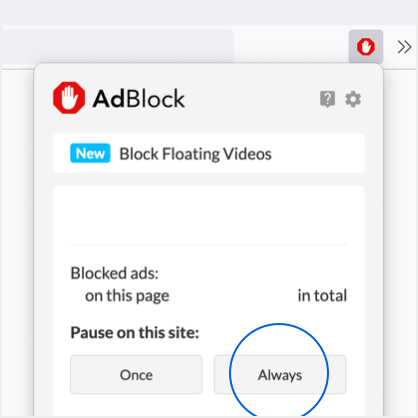
- Click the AdBlock icon in the browser extension area in the upper right-hand corner.
- Under “ Pause on this site ” click “ Always ”.
- Refresh the page or click the button below to continue.
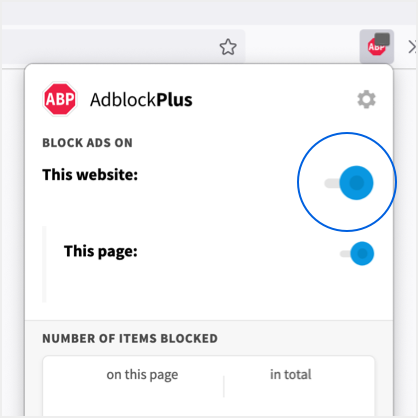
- Click the AdBlock Plus icon in the browser extension area in the upper right-hand corner.
- “ Block ads on – This website ” switch off the toggle to turn it from blue to gray.
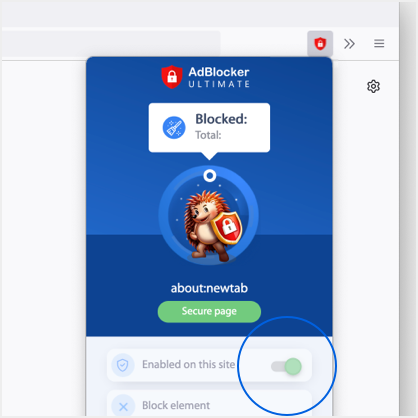
- Click the AdBlocker Ultimate icon in the browser extension area in the upper right-hand corner.
- Switch off the toggle to turn it from “ Enabled on this site ” to “ Disabled on this site ”.

- Click the Ghostery icon in the browser extension area in the upper right-hand corner.
- Click on the “ Ad-Blocking ” button at the bottom. It will turn gray and the text above will go from “ON” to “ OFF ”.
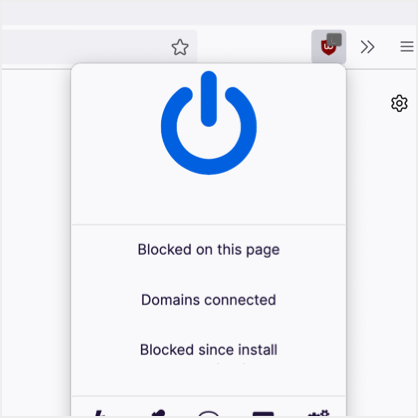
- Click the UBlock Origin icon in the browser extension area in the upper right-hand corner.
- Click on the large blue power icon at the top.
- When it turns gray, click the refresh icon that has appeared next to it or click the button below to continue.
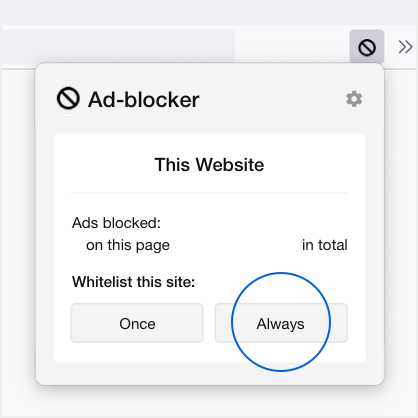
- Click the icon of the ad-blocker extension installed on your browser. You’ll usually find this icon in the upper right-hand corner of your screen. You may have more than one ad-blocker installed.
- Follow the instructions for disabling the ad blocker on the site you’re viewing. You may have to select a menu option or click a button.
Navigation Menu
Search code, repositories, users, issues, pull requests..., provide feedback.
We read every piece of feedback, and take your input very seriously.
Saved searches
Use saved searches to filter your results more quickly.
To see all available qualifiers, see our documentation .
- Notifications You must be signed in to change notification settings
Have a question about this project? Sign up for a free GitHub account to open an issue and contact its maintainers and the community.
By clicking “Sign up for GitHub”, you agree to our terms of service and privacy statement . We’ll occasionally send you account related emails.
Already on GitHub? Sign in to your account
Explanation of the state of uBlock Origin (and other blockers) for Safari #158
ghost commented Sep 8, 2019 • edited by ghost Loading
- 👍 379 reactions
- 🎉 2 reactions
- 😕 103 reactions
- ❤️ 81 reactions
- 🚀 9 reactions
- 👀 15 reactions
dpkonofa commented Sep 19, 2019
- 👍 9 reactions
- 😄 1 reaction
Sorry, something went wrong.
Tongzhao9417 commented Sep 20, 2019
Ghost commented sep 20, 2019.
- 👍 76 reactions
nheeren commented Sep 20, 2019 • edited Loading
- 👍 2 reactions
- ❤️ 1 reaction
Rjevski commented Sep 20, 2019
- 👍 13 reactions
ameshkov commented Sep 20, 2019 • edited Loading
- 👀 4 reactions
- 👍 6 reactions
freediverx commented Sep 20, 2019 via email
- 👍 20 reactions
- 👎 25 reactions
- 😄 5 reactions
- 😕 1 reaction
- 👍 7 reactions
benjamingr commented Sep 20, 2019
- 👍 15 reactions
vassudanagunta commented Sep 20, 2019
- 👍 1 reaction
- 👍 3 reactions
- 👎 1 reaction
xtian commented Sep 20, 2019
El-Fitz commented Sep 21, 2019
CrazyPython commented Sep 21, 2019
kfur commented Sep 21, 2019
Kfur commented sep 21, 2019 • edited loading, ameshkov commented sep 21, 2019.
cosmarc commented Sep 21, 2019
Ghost commented sep 21, 2019 • edited by ghost loading.
Sangeppato commented Sep 21, 2019 • edited Loading
Vassudanagunta commented sep 27, 2021.
strafe commented Jan 12, 2022
Chasapple4 commented Sep 20, 2022
emikaadeo-git commented Sep 20, 2022 • edited Loading
- 👍 4 reactions
vprelovac commented Sep 20, 2022
- 👍 5 reactions
ankitsharma07 commented Sep 20, 2022
sdykae commented Jan 24, 2023
- 🚀 1 reaction
NewteqDeveloper commented Apr 30, 2023
F1248 commented May 17, 2023
- 👀 1 reaction
alvarnell commented May 18, 2023
daslicht commented Jul 29, 2023
Alvarnell commented jul 29, 2023.
marlonjames71 commented Apr 3, 2024
Sdykae commented apr 3, 2024, daslicht commented apr 3, 2024, vprelovac commented apr 3, 2024 • edited loading, daslicht commented apr 3, 2024 • edited loading, marlonjames71 commented apr 4, 2024.
gitguys commented Apr 5, 2024
Daslicht commented apr 5, 2024.
maxexcloo commented Apr 5, 2024
Gitguys commented apr 6, 2024, daslicht commented apr 6, 2024 • edited loading, gitguys commented apr 6, 2024 • edited loading, daslicht commented apr 7, 2024, gitguys commented apr 8, 2024.
HVR88 commented Jun 9, 2024
No branches or pull requests

IMAGES
VIDEO
COMMENTS
Open-source ad blocker. The uBlock Origin is a free and open-source, cross-platform browser extension for content filtering—primarily aimed at neutralizing privacy invasion in an efficient, user-friendly method. ... MS Edge, Opera, Firefox and all Safari releases prior to 13. About uBlock Origin. In 2014 uBlock Origin's founder, original ...
Fast and lean. - el1t/uBlock-Safari. uBlock Origin - An efficient blocker for Chromium, Firefox, and Safari. Fast and lean. - el1t/uBlock-Safari ... it's advised that you don't use other inefficient blockers at the same time (such as AdBlock or Adblock Plus). uBlock₀ will do as well or better than most popular ad blockers. Other blockers can ...
Open Safari on your Mac. Click the Safari menu in the upper-left corner of your screen. Choose Settings from the drop-down menu. Then click the Extensions tab at the top of the window. Once you're on the Extensions tab, you'll see a list of all the extensions you've installed in your Safari browser.
uBlock Origin (/ ˈ j uː b l ɒ k / YOO-blok) (previously uBlock and originally μBlock) is a free and open-source browser extension for content filtering, including ad blocking.The extension is available for Chrome, Chromium, Edge, Firefox, Brave, Opera, Pale Moon, as well as versions of Safari before 13. uBlock Origin has received praise from technology websites and is reported to be much ...
uBlock Origin (uBO) is a CPU and memory-efficient wide-spectrum content blocker for Chromium and Firefox. It blocks ads, trackers, coin miners, popups, ... For reference, Adblock Plus installs with only EasyList, ABP filters, and Acceptable Ads enabled by default. It is important to note that using a blocker is NOT theft. Do not fall for this ...
To benefit from uBlock Origin's higher efficiency, it's advised that you don't use other inefficient blockers at the same time (such as AdBlock or Adblock Plus). uBlock₀ will do as well or better than most popular ad blockers. Building. To build and load an unpacked extension for development: Clone uBlock-Safari and uAssets into the same ...
uBlock Origin is the most powerful and versatile ad blocker available. Unfortunately, the design is also a little obscure. This guide will explain the ins and outs of uBlock Origin's advanced features, including adding custom lists, creating custom user filters, setting up dynamic blocking rules, and adjusting rules for uBlock Origin on specific domains with the advanced user interface.
Add uBlock to your browser to automatically block ads, pop ups, and trackers. Browse faster. If you want an ad blocker for Firefox, Chrome, or Safari, uBlock is here. uBlock blocks all annoying pop-ups and ads. uBlock is more than just a pop up blocker, it also protects your privacy by blocking trackers. Download the uBlock ad blocker for free!
Show the Develop menu in Safari by going to Preferences > Advanced and checking Show Develop menu in menu bar. In Safari, load the Extension Builder (Develop > Show Extension Builder) Click the + button in the bottom left corner and "Add Extension". Select dist/build/uBlock0.safariextension. Click install and enter your password.
Ublock Origin is a browser-based ad blocker that focuses on simple, efficient blocking with a low resource overhead. ... If you're a Safari fan, Wipr may be the best ad blocker for both your Mac ...
As for other browsers, Apple's Safari isn't bad when it comes to privacy, but it lacks wide support for popular browser extensions. ... Ad blocker: uBlock Origin. Chrome/Firefox.
About this extension. uBlock Origin is not an "ad blocker", it's a wide-spectrum content blocker with CPU and memory efficiency as a primary feature. ***. Out of the box, uBO blocks ads, trackers, coin miners, popups, etc. through the following lists of filters, enabled by default:
Install uBlock Origin for Safari. Download the file bellow, double click on it and click on `Trust` when you are asked `Are you sure you want to install the extension "uBlock Origin"?`. An efficient blocker add-on for various browsers. Fast, potent, and lean.
IMPORTANT: uBlock Origin is completely unrelated to the site "ublock.org". uBlock Origin is not an "ad blocker", it's a wide-spectrum content blocker with CPU and memory efficiency as a primary feature.
Nothing works on Safari the way that uBlock works for the rest of the browsers. I've tried all Safari adblock extensions. I paid for Wipr, it has 88% efficiency. Tried AdGuard, the same and heavy on resources. Ghostery is the best for me but still lots of ads slip through.
r/Safari. r/Safari. • 1 yr. ago. dev3lop3r. Thinking to bring back ublock origin for Safari. Hey Redditors! I have been looking for a good open source ad-blocker extension for a quite sometime, but couldn't find something similar to what ublock origin does, so I'm now thinking to port the same for safari or maybe an ublock inspired open ...
Orion browser is a Safari alternative, also running WebKit, and supporting uBlock Origin. I was in the exact same dilemma as yours. I can't think of browsing without uBlock but Safari on M1 air is most optimised of all, so I tried many content blockers (free ones though, I didn't test any paid one) and after a few months settled for AdGuard ...
An ad blocker has access to everything you do in the browser so if you can't trust it than there's a problem. uBlock Origin is open source so while I don't know what to look for there are those that do and would find anything shady. So far Firefox is working well with uBlock Origin to do what Safari 12 did. Hopefully Firefox won't follow this ...
iPad. Vivaldi. Google Chrome. Safari. Yandex Browser. Opera. Mozilla Firefox. 115 AdGuard alternatives. AdGuard is the best way to get rid of intrusive ads and online tracking, and to protect your computer from malware.
Fast and lean. - rezzo/uBlock-Safari. uBlock Origin - An efficient blocker for Chromium, Firefox, and Safari. Fast and lean. - rezzo/uBlock-Safari ... it's advised that you don't use other inefficient blockers at the same time (such as AdBlock or Adblock Plus). uBlock₀ will do as well or better than most popular ad blockers.
Back to all articles Guide. Ghostery for Safari Gets a New Home on the Apple App Store
1 - uBlock Origin. uBlock Origin is the top content-blocking extension for Firefox, with over 7 million downloads. While some think of it as just an "ad blocker," it does much more.
Build by running ./tools/make-safari.sh in uBlock-Safari's directory; Install the unpacked extension through Safari's Extension Builder In Safari, load the Extension Builder (Develop > Show Extension Builder) Click the + button in the bottom left corner and "Add Extension" Select dist/build/uBlock.safariextension; Click install and enter your ...
Click the UBlock Origin icon in the browser extension area in the upper right-hand corner. Click on the large blue power icon at the top. When it turns gray, click the refresh icon that has appeared next to it or click the button below to continue. Click the icon of the ad-blocker extension installed on your browser.
If you are a current user of uBlock Origin for Safari here are the options to continue blocking ads: For the moment continue to use Safari 12 with uBlockOrigin. Anybody with uBO currently installed, it won't be removed until you update to Safari 13. ... AdBlock Plus for Safari - Supports acceptable ads, a pay-to-play ad allowing system which ...
It has features that many people will want in an ad blocker, like an ads blocked counter and whitelisting. Meanwhile, Wipr was made for the Apple environment. It's more limited, but it was intended to be that way, allowing for easy integration between iOS and macOS. From our tests and the features included, Adblock Plus is the better ad blocker.